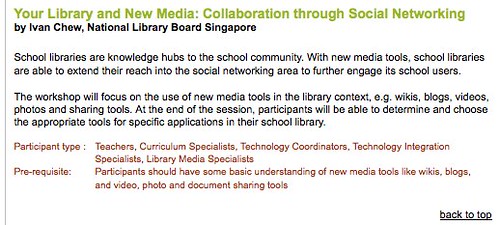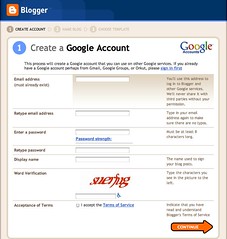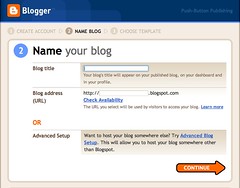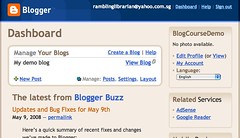DISCLAIMER: This blog serves as a teaching and demonstration tool. It is NOT affliated or endorsed by any organisation.
March 10, 2010
Examples of social media sites - Writing For Social Media Workshop 10 Mar 2010
http://twitter.com/SCDF
REACH Singapore
http://twitter.com/reach_singapore
Starhub
http://twitter.com/StarhubCares
Singapore Police Force FAcebook page
http://www.facebook.com/singaporepoliceforce
George Yeo (in personal capacity)
http://www.facebook.com/georgeyeo
http://www.beyondsg.typepad.com/ (guest blogger)
Ministry of Health blog
http://mohsingapore.blogspot.com/
March 01, 2010
September 07, 2008
Test: Archive.org music player
August 04, 2008
Suggestions from workshop participants
- Use appropriate tools to apply in courses and prgs
- Enrich the learning experience for students
- using new media as a form of learning and teaching
- Use blog to showcase book reviews
- Contribute to NLB Read & Reap
- Better support the curriculm
- increase readership
- greater student participation in library activities
- create a more vibrant community
- Achieve higher level of literacy
- Sharing of media resources (share school media content with others)
- Increase students interest in books
- Using new media to attract students to the library
For this workshop.
August 03, 2008
Your Library and New Media: Collaboration through Social Networking
For the International Conference on Teaching and Learning with Technology (ICTLT), 5-6 Aug 2008.
Pre-conference workshop (4 Aug 2008):

A SELECT LIST OF ONLINE TOOLS
Blogs
Wikis
Video-sharing
Podcasting
Photos
Powerpoint slides
Other Social Networking platforms
- Twitter.com
- Ovi (Nokia) [see Wikipedia entry]
- Delicious.com (social bookmarking) | my example
- SharedCopy
Copyright & Creative Commons
- Copyright (IPOS)
- Copyright Act (Singapore Statues)
- Creative Commons (see: Comic | Video)
- Photos: Flickr.com
- Music: ccmixter.org
- Google Advanced Search (click on the "+" sign that says "Date, usage rights, numeric range, and more").
- MIT open courseware project
- Internet Archive
Some considerations in selecting a social sharing service (please add your thoughts as comments)
- What are your goals & objectives?
- Are you prepared for your works to be used without attribution?
- Free or Fee, or both
- Ease of Use
- Is that service popular? (why do you think this matters?)
- Who are the main users of that service?
- What's the popular image/ branding of that service?
- What's your preferred degree of control of your content? (e.g. private Vs. public access, moderation)

This work by Ivan Chew is licensed under a Creative Commons Attribution-Noncommercial-Share Alike 3.0 License. Feel free to use this as per the terms of use. For permissions beyond the scope of this license, or if you wish to clarify what the license mean, please contact via RamblingLibrarian [at] gmail.com.
May 30, 2008
Workshop 1.3 – New Media – How to set up a school library blog with no budget
S chool Library Symposium - 30 May 2008, Jointly organized by NLB & MOE
chool Library Symposium - 30 May 2008, Jointly organized by NLB & MOE
Workshop 1.3 – New Media – How to set up a school library blog with no budget
By Mr. Ivan Chew, Manager, Adults & Young People’s Services
Aims of the session:
Understand how blogs can be used as publicity tools to engage students and the school community
Through a hands-on exercise, learn how to create and manage a school library blog
Learn how to engage bloggers and users in the blogosphere
YOUR ASSIGNMENT FOR THE NEXT 1.5 HOURS
- Create a blog with Blogger.com
- Publish at least THREE posts (suggestions: Record the learning points from this workshop. Or interview the person next to you.)
- Add your blog here, by leaving a comment
- Delete your blog (if you choose to do so)
CREATING A BLOGGER.COM BLOG - ON-SCREEN NOTES: START HERE
REFERENCES
- Creating blogs with Blogger.com
- Tips on using Blogger.com
- A highly subjective and biased list of social media tools for libraries, librarians, library school coordinators
Questions & Comments? Contact me via my blog.
A highly subjective and biased list of social media tools for libraries, librarians, library school coordinators
Here's a highly subjective and biased list of social media tools for libraries, librarians, library school coordinators :)
Useful stuff for librarians/ libraries
- Online image editor: Snipshot.com
- Shorten long URLs: TinyURL.com
- Maps: earth.google.com | maps.google.com
- Instructional: www.instructables.com
- Mindmapping tool: cmap.ihmc.us
- Open Source audio editing software – audacity.sourceforge.net | Audacity tutorials - audacity.sourceforge.net/help/tutorials
- Creative Commons - CreativeCommons.org
- ASK! a librarian - www.pl.sg
Blogs, Wikis & other social media platforms
- Blogs: Blogger.com | Wordpress.com
- Messaging: Twitter.com
- Wikis: Wikispaces.com | wetpaint.com
- Social bookmarking: del.icio.us
- Photosharing: Flickr.com | picasaweb.google.com
- Video-sharing: YouTube.com | TeacherTube.com | video.google.com
- Cataloguing: www.librarything.com
- Powerpoint: Slideshare.net
- Audio/ Video depository and resource: www.archive.org
- Documents: docs.google.com
- Online Annotation: sharedcopy.com | zotero.com
- Podcasting: podbean.com | odeo.com
RSS/ Feed Readers/ Alerts
- RSS readers: www.google.com/reader | www.bloglines.com
- What's RSS? Video from the CommonCraftShow
- Alerts: www.google.com/alerts
Search
Blog search: Blogsearch.google.com | Technorati.com
Blog 'Bulletins': Tomorrow.sg | Yesterday.sg
Statistical tools - www.sitemeter.com | www.statcounter.com | www.google.com/analytics
Discussion forums/ mailing lists: groups.yahoo.com | groups.google.com
May 26, 2008
Updated: Creating blogs with Blogger.com
Click on the images to view additional notes.
Login/ Create Blog

Go to Blogger.com to sign up for an account.
STEP 1: Create a Google account

You need a Google user account in order to create a blog with Blogger.com ('cos Blogger.com is owned by Google).
You don't need to create an account if you already have Google-related accounts like Gmail and Google Groups (read the instructions below the header "Create a Google Account".
Blogger.com requires you to enter an email address (you can always create an additional email account Gmail, Yahoo! or Hotmail).
TIP: Write down all the addresses/ IDs/ passwords that you create along the way. And keep this safe (destroy it once you've committed it to memory). Some participants get confused after signing up for a few things along the way, that they can't log in to their accounts when they try to do after the session)
The Word Verification is a feature for blogger to ensure it's a human being that's creating an account, rather than an automatic program (spambot).
IMPORTANT: Keep your password secret. Google will never, ever ask you for your passwords. If you ever receive any emails asking you for your account ID and passwords, read it very very carefully and you probably should ignore it. Because they are likely to be scam mails.
STEP 2: Name your blog

Here, you're required to enter a Title for your blog and the blog URL (the blog title can easily be changed later, from your Settings Tab. For the URL, it can also be changed provided it's not taken up by someone else. So at this stage, it's best to choose wisely at this stage).
TIP: Use the Check Availability link to confirm that your desired URL is available. Then write the URL for easy reference.
STEP 3: Choose a template

Choose a blog template. You can always change the design later. So don't spend too much time at this stage. There aren't much designs to choose from and you can spend more time customising your blog later.
Confirmation of new blog

Congratulations! You now have a blog.
Create/ Publish Post

This is where you create a new post. It's almost like composing and sending an email.
Dashboard

When you next login to Blogger.com, you'll see your Dashboard. This is where you can create a new blog, and also access your existing blog(s).
Settings tab

Go to the Settings Tab to:
- Change the blog name or description
- Delete your blog
- Change your blog URL
- Blog formatting (date/ time settings)
- Comment Moderation/ Image Verification/ Email notification
- Permissions to view/ post to your blog
Layout tab

The Layout Tab is where you can:
- Add "Page Elements" (these are things like a blogroll, counters, HTML codes for stats etc.)
- Change your fonts and colours
- Edit your blog HTML template directly
- Pick a new Blogger.com template
For more tips on using Blogger.com, read this post.
[This is an updated post, from an earlier one, dated Nov 2006]

This work by Ivan Chew is licensed under a Creative Commons Attribution-Noncommercial-Share Alike 3.0 License. For permissions beyond the scope of this license , please contact via RamblingLibrarian@gmail.com.
May 23, 2008
Tips on using BLOGGER.COM
- How do I create a blog that Blogger will host for free?
- How to delete your Blogger.com blog
- Using the Blogger.com editor
- How to moderate comments in Blogger.com
- How to delete comments
- About protecting your Blogger.com user name and password
- How do I control who can view my blog
More tips, for blogging newbies:
#1 - Write down your User ID, Password, and Blog URL somewhere (keep it safe, until you've committed it to memory).
I've seen many people get all caught up in the excitement of creating a new blog for the first time that they forget their User name, password or the blog URL. They'd lament that they can't find their blog or login etc.
#2- When creating your new blog, just choose a blog design quickly. And move on!
I've personally experienced this myself -- you spend ages choosing and mulling over the blog design template, colours, layout etc. My advice is to just quickly choose a design to get through the process. It's more important to familiarise yourself with how the Dashboard (the admin stuff) works. You can always change the design later.
#3 - Choose a consistent blog name with your URL
For instance, if I want my blog to be called "Rambling Librarian", then my preferred URL is also "RamblingLibrarian.blogspot.com". This is for consistency.
#4 - Blogger.com Vs Blogspot.com
I get this alot: Newbie creates a blogger.com blog. Then says "my blog can't be found". I'd tell them to check the URL. The blog URL should be "blogSPOT.com" and not "blogger.com". Example:
- MyFirstBlog.blogger.com is incorrect
- MyFirstBlog.blogspot.com is the correct URL
[See also: Creating blogs with Blogger.com, 26 May 2008]

This work by Ivan Chew is licensed under a Creative Commons Attribution-Noncommercial-Share Alike 3.0 License. For permissions beyond the scope of this license , please contact via RamblingLibrarian@gmail.com.
March 15, 2008
Example of Flickr Notes: "Making Mooncakes"
The photo is also embedded as part of a longer blog post.
Example of Flickr Notes: "Success!"
February 26, 2008
Podcast websites
- The Maccast - www.maccast.com
- Machelp from Hawaii - radio.weblogs.com/0142820
- My Mac Guys - mymacguys.blogspot.com
- One Minute Tip - radio.weblogs.com/0141930
- Your Mac Life - www.yourmaclifeshow.com
October 11, 2007
"Introduction To New Media Communications" Course, DAY 2: Selected links for the Podcast/ Vodcast workshop
BOOKMARK THIS URL: http://tinyurl.com/pcast123
1) PODCASTING
To produce that Podcast:Audio (in the appropriate file format)
+ Podcast hosting service
+ RSS feed
To produce that Audio:Plan >> Script >> Rehearse >> Record >> Edit
Podcast hosting services:
- Podbean.com – www.podbean.com
- Odeo.com - www.odeo.com (see also: studio.odeo.com)
- podOmatic - www.podomatic.com
Audio recording/ editing software:
- Open Source audio editing software – audacity.sourceforge.net
- Audacity tutorials - audacity.sourceforge.net/help/tutorials
- Andacity 1.2. Manual - audacity.sourceforge.net/manual-1.2/tutorials.html
Where to find Creative Commons audio (for background tracks):
- Internet Archive – www.archive.org
- Creative Commons – creativecommons.org
- CCmixter - ccmixter.org
- For the workshop: Select tracks from these links if you wish to save yourself time during the hands-on exercise: SeaStars 2007 Album; Ivan Chew's 2006 Discography.
2) VODCASTING
See Vodcast Demo - "Getting to the SMU Executive Media Theatre"
Producing that Vodcast:Video + Compress video + File hosting service + Blog and/ or RSS feed
How to Vodcast:
- playlistmag.com/features/2005/07/howtovodcast/index.php
- Vodcasting in a few easy steps (by John Larkin)
Free video hosting services:
- YouTube – YouTube.com
- Google Video - video.google.com
- Internet Archive – www.archive.org
- Revver - one.revver.com/revver
Vodcast Demo - "Getting to the SMU Exec Media Theatre"
The podcasting workshop (Day 2) would be held at the Singapore Management University, Executive Media Theatre, Administration Building.
The video was recorded with my digital camera (so the video quality isn't that great).
After I went home, I did a minor edit with the video by cutting out the walk down the passage way. I save the original clip as two files and merged them together in Apple iLife '06 iMovie.
Next, I wrote a brief script and recorded the voice over with the Audacity audio editor and recorder (which I'll be showing the participants how to use). Then saved it as a MP3 file.
The MP3 file was imported to the iMovie clip. Cuts on the audio was done in iMovie.
For the background music, I selected "Saturday In May" (a song I composed in May 2006, when I was learning my way around GarageBand). Adjustments was also made to the track volume in iMovie.
Finally, I added the transitions and titles.
Took about 45 minutes (excluding the recording of the video).
Civil Service College: "Introduction To New Media Communications" Course
"Introduction To New Media Communications" Course
Synopsis: In 2006, TIME magazine voted “You” - producers and consumers of new media content - as its Person of the Year, and gave YouTube its much-coveted “Invention of the Year”. Yes, the age of new media has arrived, even as it evolves into an intricate social web of community and collaboration.
What opportunities do new media offer to organisations seeking to further their communications objectives and target new audiences and stakeholders in this increasingly networked world? And just how does someone new to this fast-evolving landscape take the first steps to participate in its dynamism?
The Civil Service College is pleased to launch a 2-day course that adopts an interactive and hands-on approach to explore key issues related to using new media as a communications tool. Day 1 provides an overview of Singapore’s new media scene, and features industry practitioners and public service agencies that have implemented new media communications initiatives. Day 2 takes a hands-on approach in helping participants understand the culture of new media through the process of creating content for new media platforms such as blogs, YouTube podcasts, and Wikipedia.
Objective: At the end of the course, participants will be able to:
- Learn about current culture and trends in new media
- Understand key issues on use of new media for communication and information sharing
- Find out how other public sector organisations have implemented new media initiatives to engage stakeholders
- Create content for new media platforms
Course Outline:
Day One
- New media culture & trends: Singapore’s new media scene
- Incorporating new media into your communications plan
- Case studies:
- Old Stories, New Media - The Tale of Yesterday.sg
- Using new media in public communication (NLB)
- Using new media as an organisational tool for internal communication
- Measuring New Media Return on Investment
Day Two - The programme for Day 2 consists of hands-on sessions on the internet.
- Creating your first blog
- Integrating videos to your blog
- Creating podcast/ vodcasts
- An introduction to Wikipedia
- Closing summary
Trainers/ Facilitators:
Time: 9.00am - 5.30pm
Duration: Full Day
Schedule Remarks: Venue will be at SMU.
Link
September 21, 2007
Additional/ Updated references for "Overview on the "W & H" of Blogging and New Media" - 21 Sept 2007
Singapore Government Agency Blogs
[Missed out the library@Orchard blog, REACH, and "10,000 Reading Fathers" in the original handout]
- Youth.SG (MCYS) - www.youth.sg
- Programmes @ 100 Victoria Street (NLB) - dl.nlb.gov.sg/victoria
- High Browse Online (NLB) - blogs.nlb.gov.sg/highbrowseonline
- Digi.Talk (NLB) - dl.nlb.gov.sg/digitalk
- ASK! (NLB) - dl.nlb.gov.sg/ask
- library@orchard in Transit - blogs.nlb.gov.sg/orchard
- 10,000 Reading Fathers - www.10000fathers.sg/blog
- Health Promotion Board Podcasts - www.hpb.gov.sg/podcasts
- Yesterday.SG (NHB) - yesterday.sg
- Youth Advolution for Health (Health Promotion Board) - www.yah.sg
- Garden Voices (NParks) - www.nparks.gov.sg/blogs/garden_voices
- Young Gardeners (NParks) - www.nparks.gov.sg/blogs/young_gardeners
- URA Vodcast - www.ura.gov.sg/podcast/index.html
- REACH - app.reach.gov.sg/reach/BlogUs/tabid/54/Default.aspx
What is Web 2.0.?
Read this article.
What is Creative Commons?
Watch the video here.
Introduction to SecondLife
September 13, 2007
Talk on "Overview on the "W & H" of Blogging and New Media" - 21 Sept 2007
Programme Category: Public Administration - Communications
Course Title: Talk on "Overview on the "W & H" of Blogging and New Media"
Synopsis: This introductory talk gives us an overview on blogging in the new media landscape. The Internet space has created a global village for spirited and borderless communication, information sharing and learning. The advent of new media has renewed the dynamism of the cybersphere, particularly in the use of blogs.
Join us for this talk and learn how to use blogs and the basics of other new media tools. Understand the impact these new communication channels have created in our social and work environment and also learn where and how to explore their use further. Keep yourself up to date with the latest in communications.
Objective: By the end of the talk, you would be able to:
- understand the differences between traditional media and new media, with emphasis on blogging
- gain insights into the latest trends in blogging, the use of other new media tools, the reasons why people express themselves using new media and how blogging can be applied in the context of public communications
Course Outline:
- Traditional Media vs New Media - impact on the social environment and the public sector
- What are the new media tools?
- Blogging
- How do blogs differ from traditional websites and other online communications tools?
- What is blogging and why do people blog?
- Basic blogging etiquette
- Latest trends in blogging - how blogs are being used by organisations and individuals
- Overview of other new media tools:
- Podcasting/vodcasting
- Online videos
- RSS
- Wikis
- Virtual worlds
Trainers/ Facilitators: Ivan Chew
Schedule Information: 21/09/2007
Time: 2.30pm - 4.30pm
Course Fee: Complimentary
Additional Fee Info: A new initiative by CSC, IPAM to bring new media tools to our public officers.
---------------------------------------
Trainer Details
Ivan Chew has been trained as a professional librarian. Ivan graduated with 1st Class honours from the University of London in Information Systems and Management. Subsequently, he pursued a MSc (Information Studies) from Nanyang Technology University. He is in charge of Adult & Young People's Services in NLB where he manages a team of librarians in delivering services, organizing talks, workshops and outreach programmes to schools, organisations as well as local and overseas community partners. He has been training on Blogging and Podcasting workshops on numerous occasions. Currently he has 6 blogs and 1 podcast. A man of many talents, he can draw, paint as well as play guitar for an amateur band. He also counts blogging, poetry writing and playing piano as his interests. Ivan has also taken a keen interest in Library Services for People with Disabilities.
Source: www.cscollege.gov.sg/page.asp?id=75&course_id=875
Last accessed 12 Sept 2007
August 13, 2007
NEtwork Conference 2007 (National Education), 14th Aug:
Blogging And The New Media Phenomenon
Blogging as an NE tool
Ivan Chew, National Library Board
1.30pm to 3.30pm
In today's highly-connected society, almost every man and his dog own a blog. BUT DO BLOGS AND NEW MEDIA HAVE A PLACE FOR NE? Local blogger, Ivan Chew (better known as the "Rambling Librarian") will give an overview of how various New Media platforms, including blogs, can be used for NE. Participants will get an opportunity to formulate and share ideas on integrating new media tools into NE initiatives, as well as discuss ways to manage the challenges in New Media, in the context of NE.
NExus website - www.nexus.gov.sg
Source:
What's the NEtwork Conference?
Did you know that National Education (NE) was launched in schools in 1997 by then-Deputy Prime Minister (DPM) Lee Hsien Loong? Since then, many agencies in the government and non-government sectors have supported the NE effort in Singapore with initiatives of their own.
The first NEtwork Conference was organised in 2003 for about 850 NE practitioners, who gathered to take stock of the progress of NE since its launch, as well as look forward to its future directions. Then-DPM Lee Hsien Loong was the guest-of-honour at the event.
www.mindef.gov.sg/imindef/mindef_websites/topics/nexus/microsite/netwrk_conf/home.html
Last assessed 13 Aug 2007
What NE is, and isn't
- The history of National Education
- Is National Education just government propaganda?
- Is National Education meant to be alarmist?
===============================
Here's an initial list of NE (National Education) related blogs (courtesy of Kelvin Lim from Nexus):
HISTORY
HISTORY - PERSONAL ACCOUNTS
- Block 13
- Good Morning Yesterday
- Times of My Life
- Save Our Chinese Heritage
- Singapore Stuff
- Bullock Cart Water
- Pasir Panjang Stories
SCHOOL NE BLOGS
ABOUT SINGAPORE
- Beyond SG
- Eye e City
- Memories of Singapore
- The Janvision Gallery (photos of Singapore and Malaya 1960 - 1990)
- Historical Chinese Architecture in Singapore
- Chinese Temple
- SingaporeSights
- Sin Tua in Singapore (Chinese Shrines)
IDEAS FOR CONVEYING THE NE MESSAGE (how feasible do you think they will be?)
- Book recommendations
- Historical reenactments
- Films
- Songs
- Art
- Storytelling for NE
What makes bloggers tick?
- Know Thy Blogger, Know Thyself (13 Oct, 2005)
- From Good Morning Yesterday
- Why Do You Blog: A Uses-and-gratifications Inquiry Into Bloggers' Motivations by Dan Li (Aug 2005) - http://lidan.net/research/doc
/Li_Dan_Aug_2005.pdf (thanks to Kevin for the heads-up to this article)
Selected "I Am Singaporean" Meme
Words
- The Flag - poem
- Flying the Singapore Flag
- Not Just a Foreigner's War - by Edgar Liao - "Edgar revisits the Battle of Pasir Panjang, touching on the Malay Regiment's role and its implications for us today." (thanks to Kenneth for this)
Maps
Songwriting as a way to promote NE awareness - see:
songcraft.wordpress.com/2007/08/03/singapore-songwriter
Chinese-language blog by Chung Cheng High School students who are documenting aspects of their school's history for the upcoming exhibition of "Student Life and Activities In Singapore, 1945-1965" - www.19451965.blogspot.com
Oglivy's Executive Blogger’s Guide to Building a Nest of Blogs, Wikis, and RSS - PDF file (hat-tip to PRspeak)
10 tips for a Great Blog - see this earlier post
Starting a new blog (part 1) - A post from 2006, on my personal thinking process in starting a new blog (some aspects are applicable to starting an organisational blog)
YOUTUBE VIDEOS
- National Day ("What jokers singapore army boys doing when they are extremely bored")
- Army Daze - 1/9 ("Singapore-made 1996 comedy movie. About 5 recruits under-going Basic Military Training")
- Every Singaporean Son (SAF National Service Video)
- Singapore Army TV Commercial - "Breaking New Ground"
- Knock It Down - Singapore Armed Forces (SAF) - ("Knock it down" - A military slang for pushups. This video clearly depicts the course of army. And I was a PTI, so i know how it went. Enjoy guys!")
- 41st SAR POP Parade ("on 15March 2006..OncE ArmouR Always Armour !! Singapore Armed Forces Rulez!")
- Ghost that scared the sh*t out of Singapore Soldiers!
- SAF FIBUA Demo
- Tribute to the United States Marine Corps
- United States Marine Corps
- US Army Drill Team
- British Army
- What sort of reactions would be get from different audiences?
- Would we allow similar videos to be made?
- Would the "Permission-Granted If You Abide By..." concept be better than a "Permission-Denied By Default" rule?
- What are the potential "Can Of Worms" that would be opened up?
Selected tools
- Odeo.com (Audio)
- Internet Archive (Video/ Audio/ Text library)
- YouTube (Video)
- TeacherTube (Video)
- SlideShare (Powerpoint)
- Flickr (Photos/ Images)
- Del.icio.us (Web Bookmarks)
- Blogger (Blog)
- Wordpress (Blog)
- Wikispaces
- Technorati (Blog Search tool)
July 26, 2007
One good use of a helmet cam
Via Kevin.
July 12, 2007
Links for MOE ExCEL FEST 2007, 13 July 2007
Services/ Tools
- YouTube (Video)
- TeacherTube (Video)
- SlideShare (Powerpoint)
- Flickr (Photos/ Images)
- Del.icio.us (Web Bookmarks)
- Blogger (Blog)
- Wordpress (Blog)
- Wikipedia (Encyclopedia); see also:
- "Pi" latest version & permanent link
- Citing specific versions
- Technorati (Blog Search tool)
- Google Blog Search
Online Safety
- Think Before You Post (Everybody knows your name) (YouTube video 1:00 min)
- Think Before You Post (Online photos) (YouTube video 1:00 min)
- Think Before Posting Your Info Online. CBSnews.com, 10 May 2006
Education-related blogs/ School blogs/ Educators' blogs
- Peihua Secondary School Jalan Kayu Trail blog; see also:
- The General Paper; See also:
- General Paper (Millennia Institute)
- COM125 Study Guide
- Innova JC New Media Arts
- "Innova JC UK Humanities Study Trip" (YouTube video 3:35 mins)
- SecondLife @ Victoria Junior College
- Republic Polytechnic Official Weblog
- Special Education Teacher in Washington DC
- From the trenches of Public Ed.
- USFblogtastic (Group blog for students and prof in Digital Journalism)
- Dangerously Irrelevant (on technology, education and future of US schools)
Copyright
- Intellectual Property Office of Singapore
- Creative Commons; see this video also.
- Archive.org (just one source of open-source; "Some Rights Reserved" content)
NLB Blogs
- High Browse Online (book blog)
- ASK! (Questions and Answers)
- Digi.Talk (Digital Resources)
- Programmes@100 Victoria (National Library programmes)
Useful stuff to explore
- "NTU Lecturer Feedback Damn Funny" (YouTune video 8:25 mins; skip to 1:40 mins); see also "Youtube Campus Superstar", Digital Nanyang Chronicle)
Citizen Journalism Boot Camp (YouTube video 3:04 mins)
MOE Press Release: 1st National Interschool Blogging Championship, 20 May 2005 - Instructables.com
- Snipshot.com
- Wikispaces (Wiki); see also:
- Tomorrow.sg (Moderated bulletin of Singapore bloggers)
- Ping.sg (Unmoderated listings of Singapore bloggers)
- Yesterday.sg (Heritage Blog, supported by NHB)
- Youth.sg (Lifestyle blog for youths, supported by MCYS)

